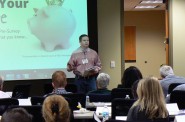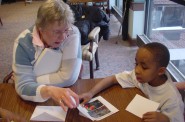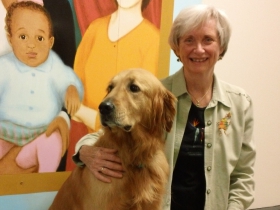Bobbi Timberlake
“Becoming a therapy dog handler has been an exciting adventure for me.”
What made you decide to become a volunteer?
I was involved with community issues for my entire working career, first at the Teen Pregnancy Service of Milwaukee and then directing the Service Learning Program at Marquette University. When I retired I knew I wanted to continue my community involvement.
Describe the organization where you volunteer.
Meta House is a wonderful organization that provides many types of services—both residential and outpatient–to women working to overcome addictions. One of the unique features of Meta House is that clients’ young children may stay with their mothers in residential care, and are also included in some of the programming.
What kind of help do you provide?
I have been involved at Meta House for about four years, first as a table captain for their fundraising/information day called “A Day for Meta House.” I have now served as a table captain four times. I was also on the committee that planned the 50th Anniversary celebrations.
My main and ongoing role at Meta House has been bringing my therapy dog, a Golden Retriever named “Chobe,” there several times a month. Chobe and I attend both process and educational groups. He “works the crowd,” going to anyone who would like some time petting him. There is evidence that stroking an animal lowers a person’s blood pressure and stress level (also the dog’s, by the way). Both clients and staff at Meta House seem to benefit from spending time with Chobe. Clients who are feeling especially anxious — or who just really love dogs — sometimes get down on the floor with him to get almost full-body contact.
When you think about your paid jobs, how is a volunteering different?
With volunteering, it’s easier to let people know you’ll be unavailable for a day or awhile. I try to be as consistent as possible but retirement life can pull you in several directions, so it’s often a balancing act. Perhaps one of the more difficult aspects of being a volunteer is that you’re always on the fringes of the organization, not involved in decision-making. That can be hard, but it’s also something of a relief not to have that kind of responsibility any more.
What new things have you learned through this volunteering?
I’ve learned so much about the nature of addictions and efforts at recovery. But mostly I’ve learned to respect and appreciate the struggles, fortitude, and great wisdom of so many of the women who come to Meta House. It’s been awe-inspiring.
Having worked alongside many non-profits, I truly admire the work these organizations do. While so many in the world are out for their own personal gain, people who work in social-service agencies do enormous amounts of good and show an amazing level of caring for people they serve, regardless of compensation.
Has volunteering helped you, has it had benefits for you?
Sure, all the volunteer work keeps me feeling connected to my community and the issues of the day.
What are you proudest of accomplishing in your work as a volunteer?
Doing what needed to be done to get Chobe registered as a therapy dog and then becoming a therapy dog handler. Not having grown up with dogs, I’ve come to this work quite late, so it’s been an exciting adventure for me—and certainly very different from the work I did in my career.
Would you recommend volunteering to others?
Yes. Often when people are considering retiring they worry about how they’ll feel useful and valued. My stock response is, “There’s plenty of work to be done. All you have to do is figure out where your interests lie and plug yourself in.”
How would you suggest someone begin if they want to volunteer?
I spent the first year after retiring trying to identify my main interest areas. I used two measures: 1) what issues or stories brought tears to my eyes and 2) when scanning the headlines, what articles would I take the time to read all the way through. I came up with four main interests: dogs, women’s issues, food issues, and veterans and I set out to find ways of involving myself in them. My work at Meta House, of course, covers two areas, so that’s a bonus. I’m now also taking Chobe, on a regular basis, to Dry Hootch, where we both interact with veterans.
To learn more about Meta House, go to metahouse.org. To find additional volunteer opportunities in our community, go to www.volunteermilwaukee.org, a Service of the Nonprofit Center of Milwaukee.
Milwaukee Volunteers
-
Rochelle Neu Sews Things For Kids
 Jan 11th, 2016 by Nonprofit Center of Milwaukee
Jan 11th, 2016 by Nonprofit Center of Milwaukee
-
Tom Parks Teaches Financial Literacy to Teens
 Sep 17th, 2015 by Nonprofit Center of Milwaukee
Sep 17th, 2015 by Nonprofit Center of Milwaukee
-
Suzanne Osetek Has Volunteered for Eight Years
 Aug 9th, 2015 by Nonprofit Center of Milwaukee
Aug 9th, 2015 by Nonprofit Center of Milwaukee






















